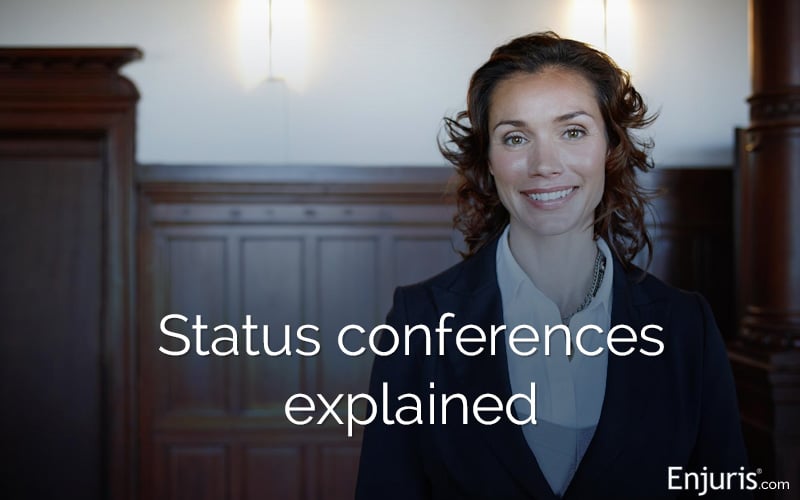
There’s no doubt about it; lawyers talk differently.
Legal phrases like “res ipsa loquitur” and “interlocutory” sound like they’ve sprung from a fantasy novel. So it might surprise you to learn that the term “status conference” is actually quite straightforward.
Let’s unpack this term together, breaking down what a status conference is, why it’s conducted, and how it could impact the trajectory of your personal injury case.
What is a status conference?
A status conference, sometimes called a “case management conference,” is a meeting between the parties of a lawsuit, their attorneys, and the judge. This conference occurs before trial and is typically held in the judge’s chambers or a courtroom.
Have other questions about personal injury lawsuits? Check out our comprehensive Questions & Answers archive.
What is the purpose of a status conference?
So, why do courts conduct status conferences? There are several reasons:
- Scheduling: A primary purpose of a status conference is to set a timeline for the case. This schedule could include deadlines for discovery, pretrial motions, and the trial date itself.
- Case management: During a status conference, the judge assesses the case's progress. They will review what work has been done and what needs to be done to move the case toward resolution.
- Streamlining issues: A status conference is an opportunity to identify and narrow down contentious issues in a case. By doing this, the parties can focus their efforts more effectively and avoid unnecessary disputes.
- Encouraging settlement: A status conference encourages parties to start negotiations on a settlement agreement. Sometimes, a judge will even give their opinion on a settlement offer. If a case can be settled without a trial, it typically saves time and resources for all parties involved.
Status conferences are not limited to civil matters; they play a significant role in criminal cases too. In criminal cases, these conferences bring together the prosecution and defense attorneys, providing an opportunity for them to exchange evidence and engage in plea bargain discussions.
What happens during a status conference?
The agenda for a status conference varies depending on the nature of the case, the judge, and the jurisdiction. However, some common discussions during a status conference may include the following:
- Reviewing the progress of the case to date
- Addressing any pending or anticipated motions
- Discussing potential settlements
- Setting dates for important events such as discovery deadlines, hearings, or the trial
During the status conference, the lawyers should be prepared to discuss all of the above topics.
Plaintiffs and defendants are not always required to attend status conferences. In fact, it’s common for attorneys to attend status conferences via telephone. If you have reservations about attending a status conference (perhaps you have a strict work schedule), be sure to let your attorney know.
How a status conference impacts your personal injury case
A status conference can impact the course of your personal injury case. For one, if the judge believes the case is not moving forward in a timely manner, they will take steps to push the case forward. This can be particularly beneficial for the plaintiff, who may be relying on potential compensation to cover medical bills and other expenses.
Moreover, status conferences provide an opportunity for your lawyer to bring up any potential issues in your case that you might want to be addressed.
Status conferences also serve as a reminder for both parties to continue settlement discussions.
The status conference is an essential part of the legal process. Understanding its purpose and potential outcomes can help you use the status conference as a tool. Remember, each case is unique. While this post provides a general overview, you should consult with your attorney if you have questions about your specific situation.
